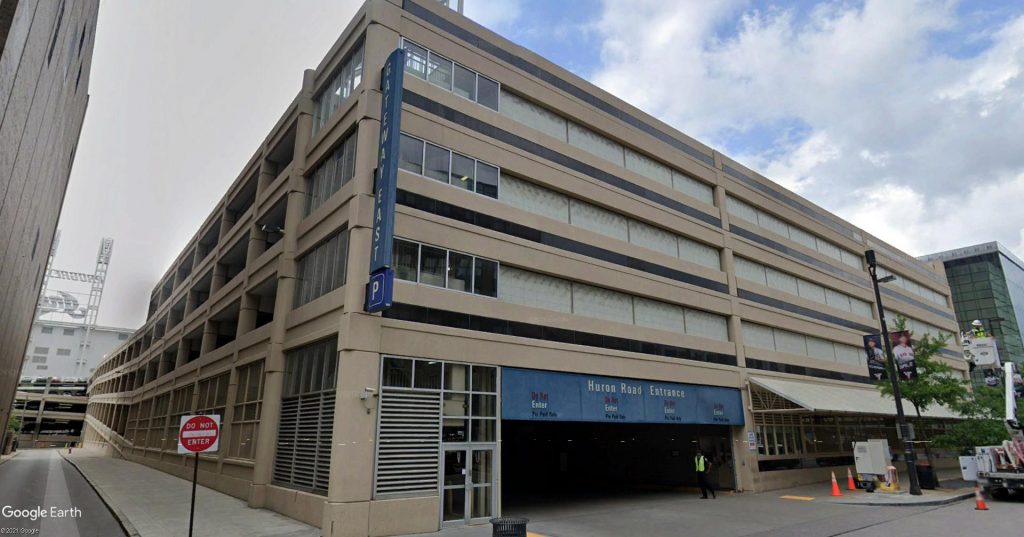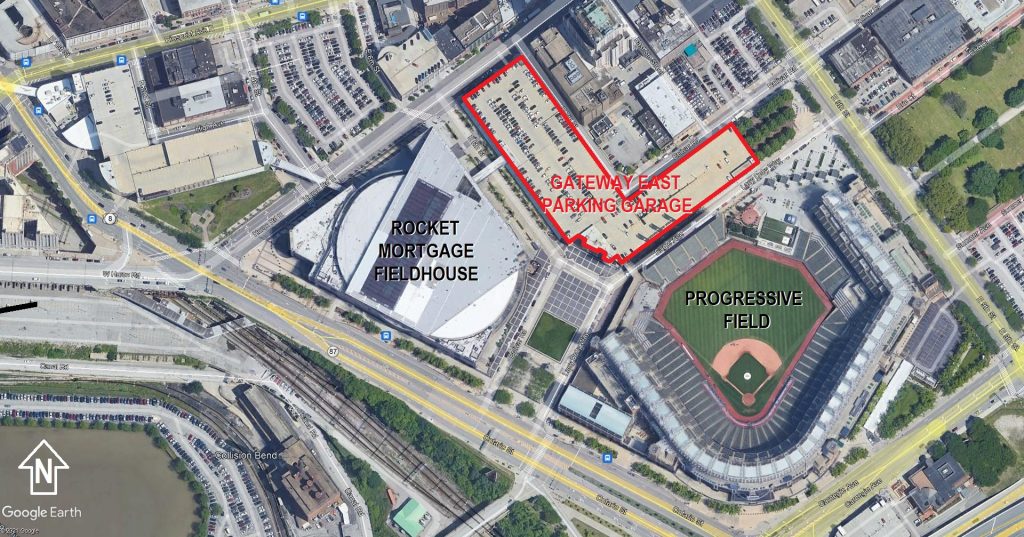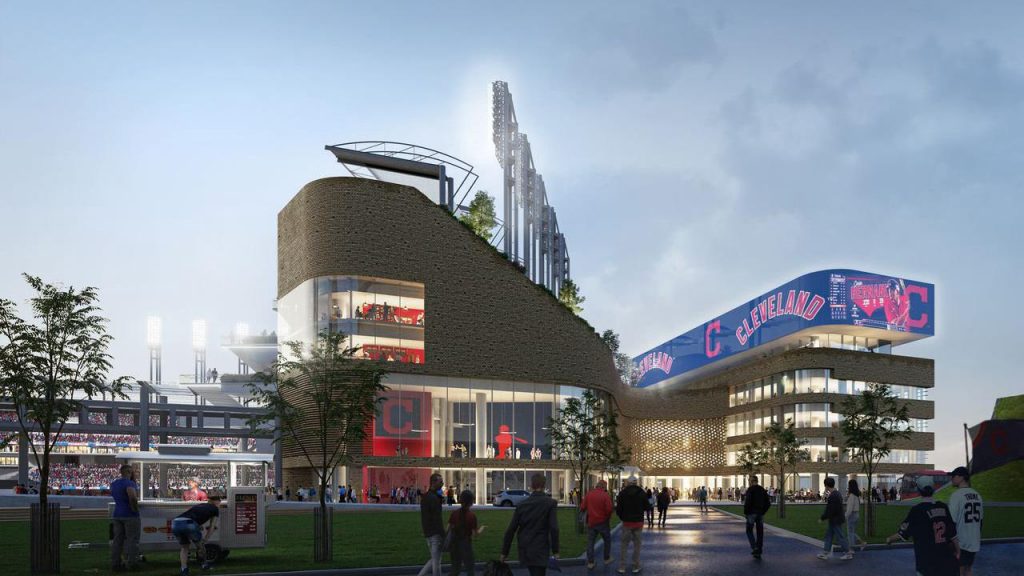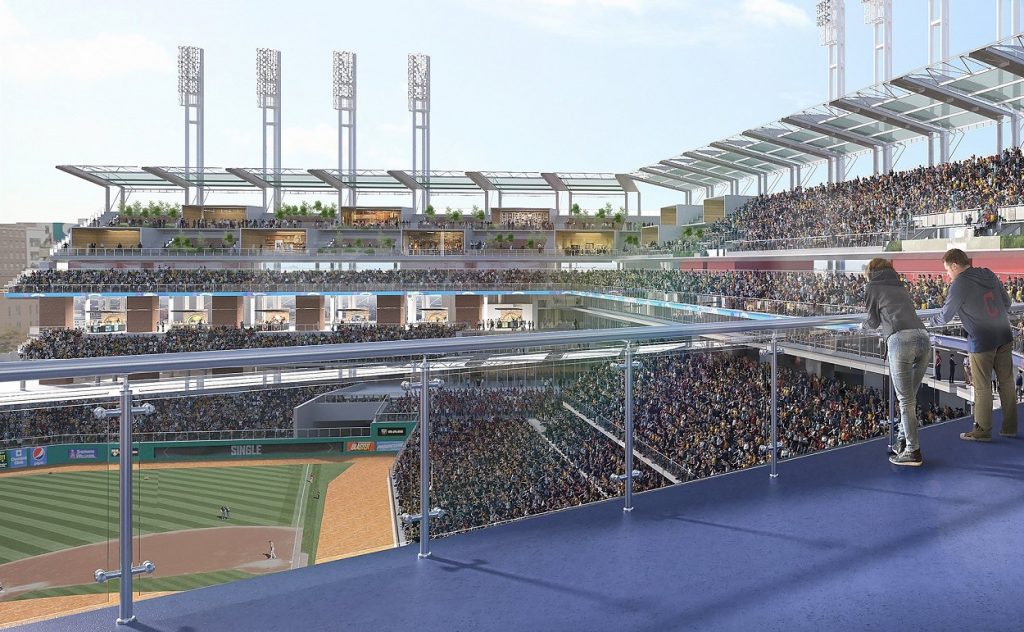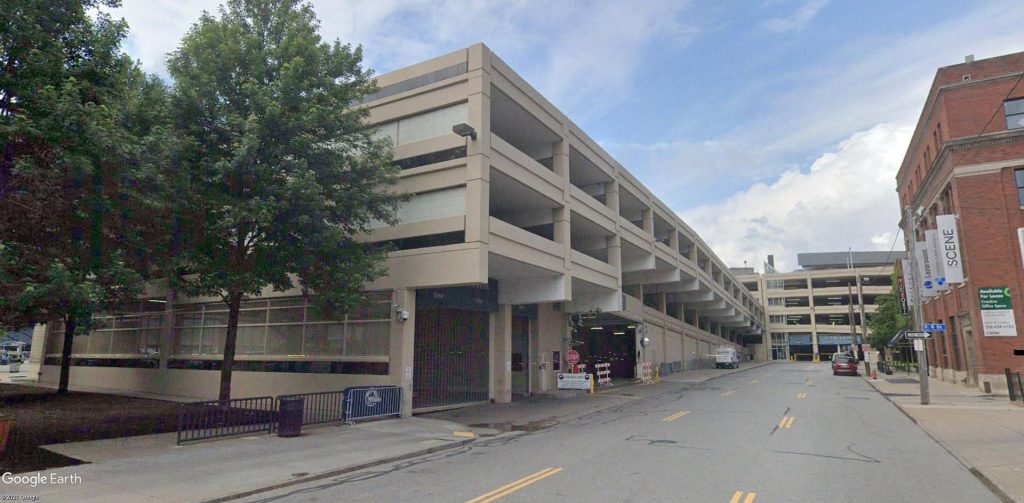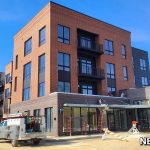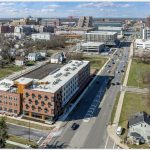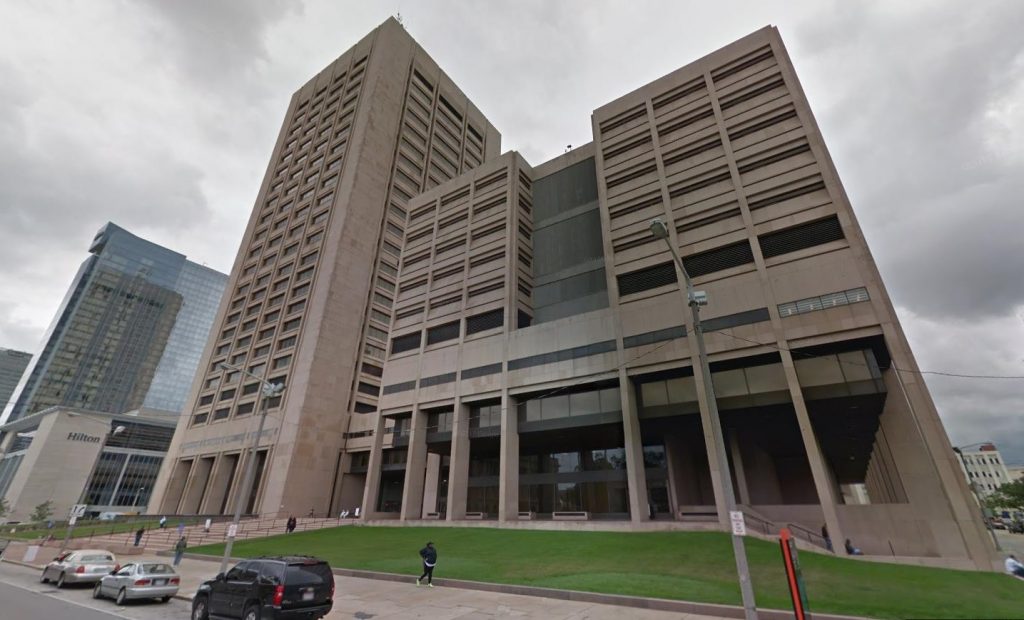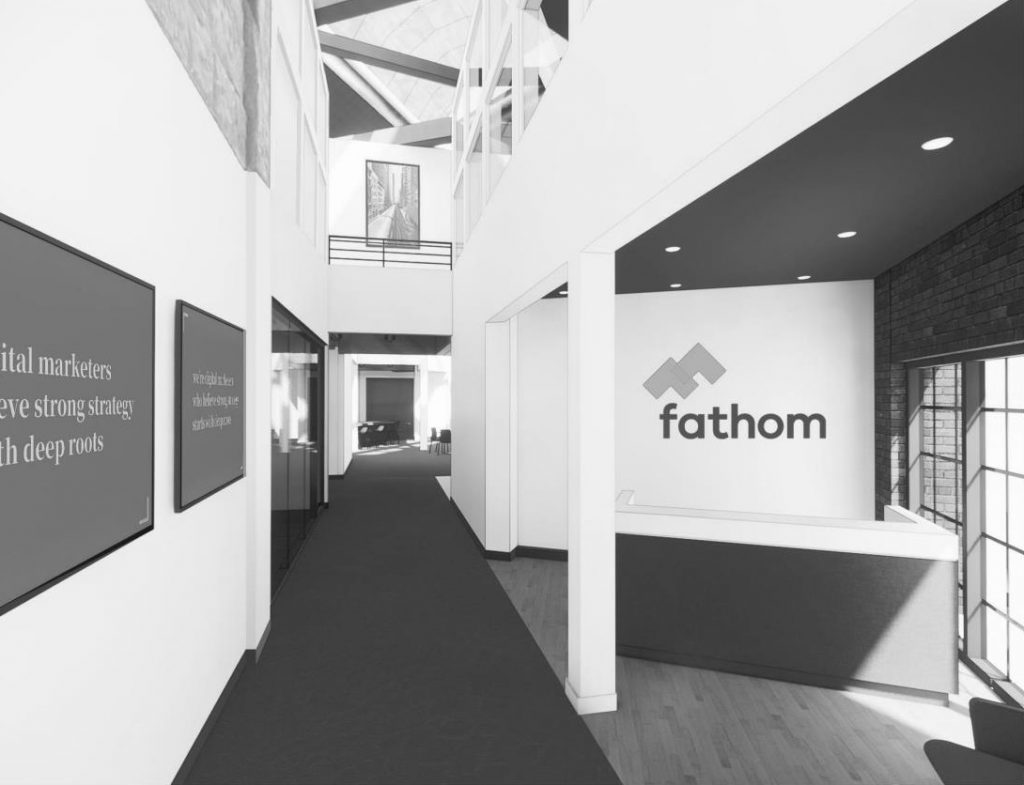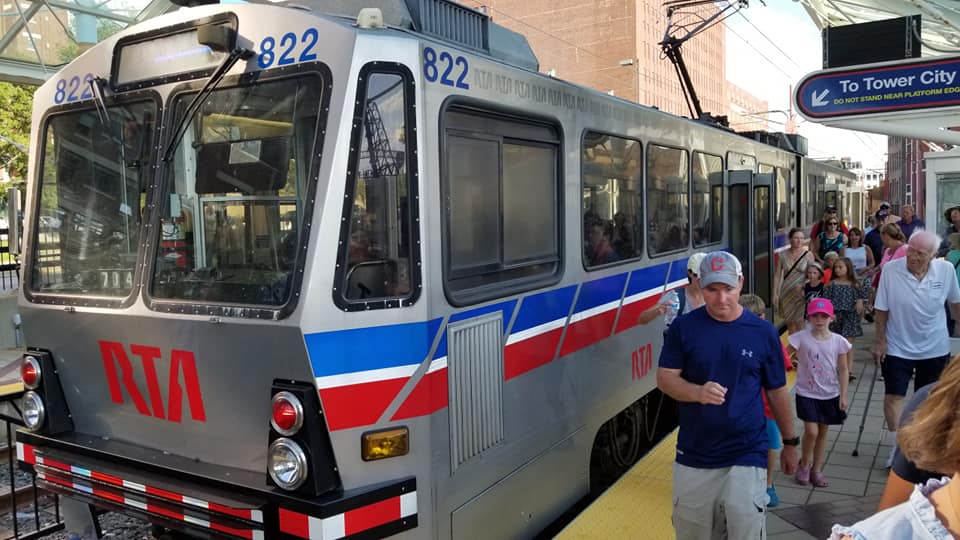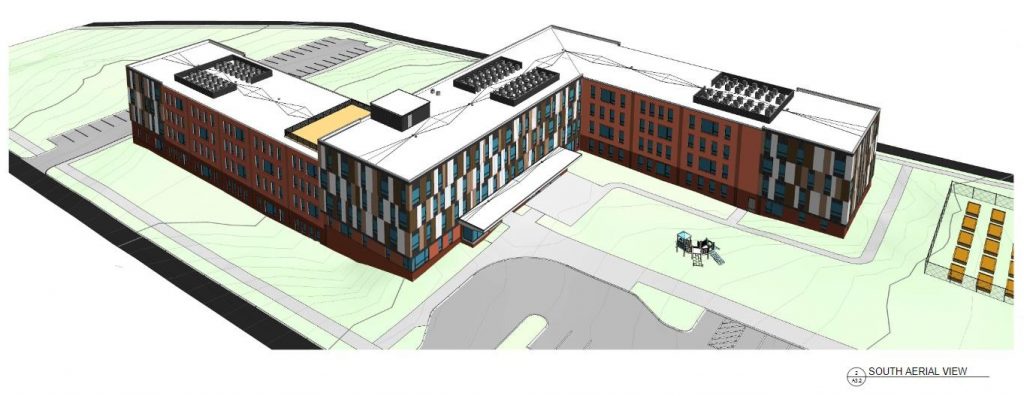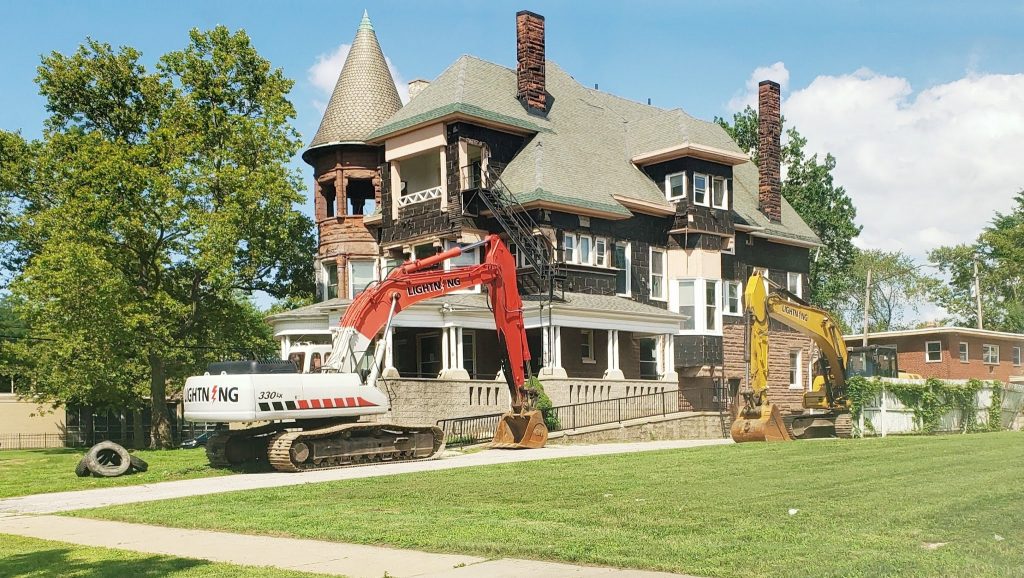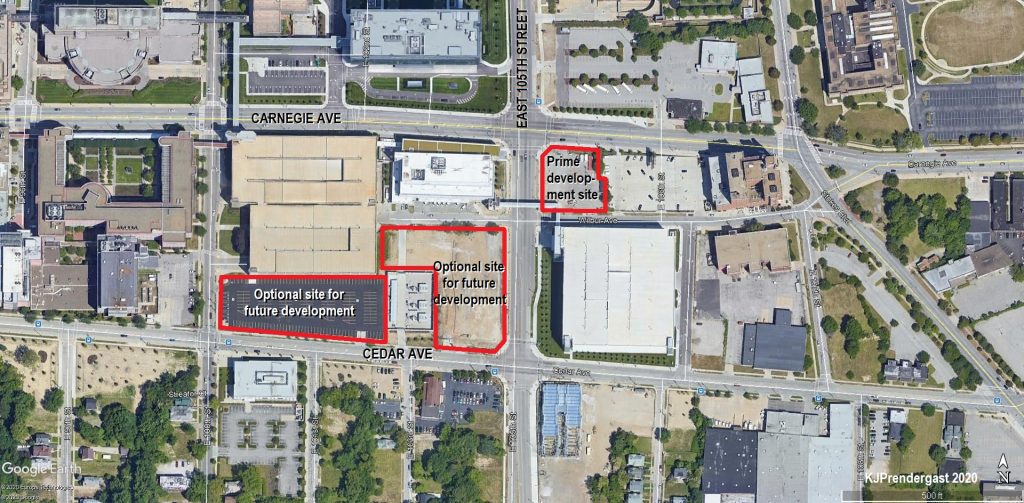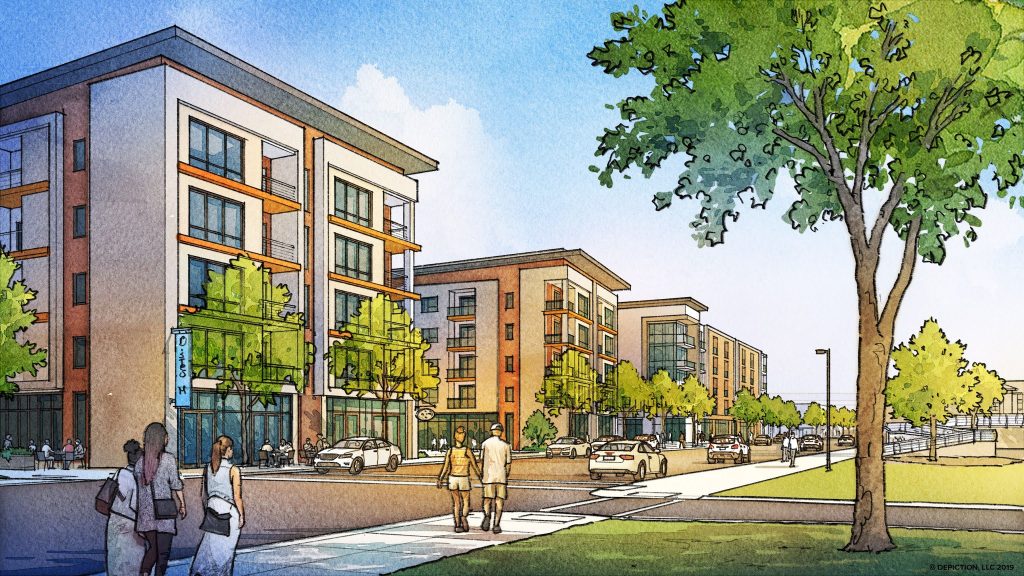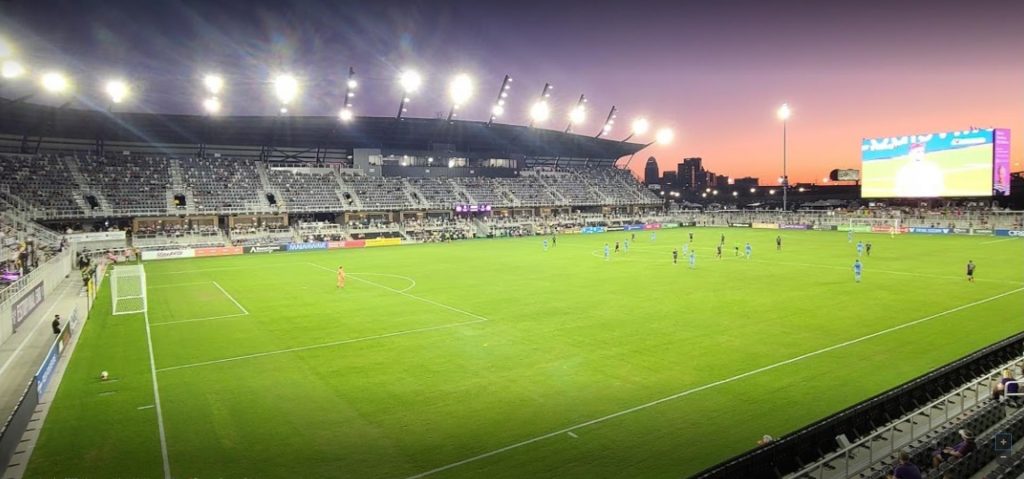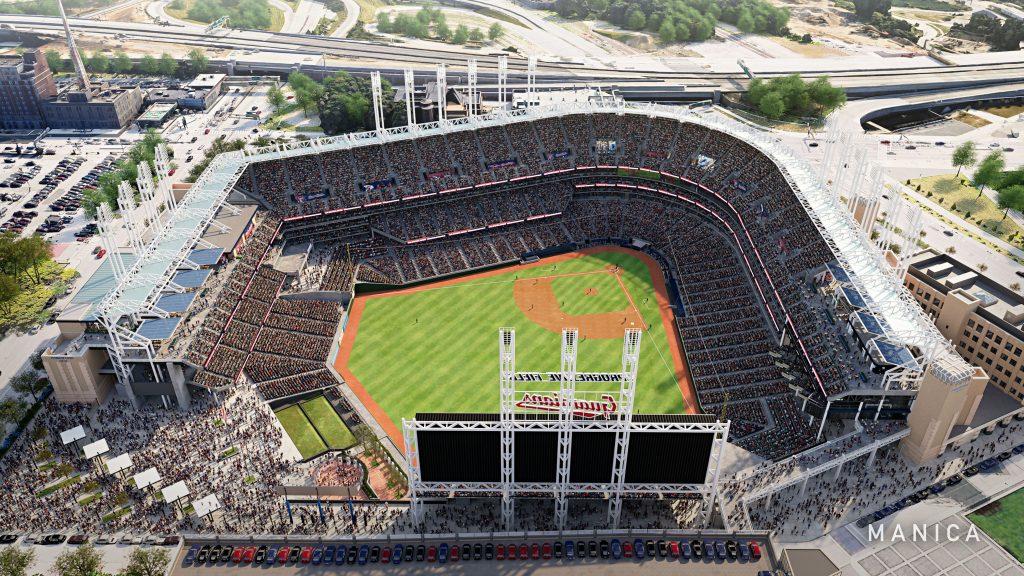With an office-like façade along Huron Road, the massive Gateway East Garage extends south along the East 7th Street alley and then west along Bolivar Road, behind Progressive Field’s scoreboard. The Cleveland Indians/Guardians may acquire the 1994-built city-owned parking garage in 2024-25 and sell or partner with a real estate investor to redevelop it (GoogleEarth). CLICK IMAGES TO ENLARGE THEM.
As part of its ballpark renovation plan, the Cleveland Indians may acquire one of the largest parking garages in downtown Cleveland. The city-owned, 1,650-space Gateway East Garage, 650 Huron Rd., might then be sold to a real estate investor who would demolish some or all of the structure for redevelopment, according to two sources.
Both sources spoke off the record to NEOtrans and outlined the Major League Baseball (MLB) team’s vision for financing $435 million worth of proposed renovations to the 1994-built Progressive Field. The Indians (to be called Guardians after this season) in August signed a public-private partnership deal with the city of Cleveland, Cuyahoga County and the state of Ohio to remain at Progressive Field for at least another 15 years after the club’s current lease expires following the 2023 season. Two optional five-year lease extensions are included.
The sources said the city is being asked to establish a Tax-Increment Financing (TIF) district for a “ballpark village” around Progressive Field from which taxes produced by real estate developments in that district would support the ballpark’s renovations. Such ballpark villages and, occasionally, value capture mechanisms were established in other MLB cities including Atlanta, Boston, San Diego, Washington DC and St. Louis.
The L-shaped Gateway East Garage is proximate to both the Cleveland Cavaliers’ Rocket Mortgage Fieldhouse and the Cleveland Indians/Guardians Progressive Field. But the massive garage loses money each year, which means it could be partially or entirely demolished and replaced with a smaller garage incorporated into a mixed-use development to generate revenue for the planned renovation of Progressive Field (Google Earth).
Sources said the city would likely sell the money-losing garage to the baseball club for a below-market price. To raise money for ballpark renovations, the team would seek to sell it for a profit to an as-yet-undetermined buyer to demolish and redevelop some or all of the garage. The new tax revenues produced from the redevelopment would be captured by the ballpark village TIF to help support Progressive Field’s renovations.
Curtis Danburg, the Cleveland Indians vice president of communications and community impact, confirmed a part of the sources’ information.
“As part of an overall plan to renovate Progressive Field, which has been reached between the Indians, the City of Cleveland, Cuyahoga County and Gateway Economic Development Corporation (landlord for Progressive Field), the club has been offered the opportunity to purchase the garage which services Progressive Field,” Danburg wrote in an e-mail to NEOtrans. “The purchase opportunity is available to the club for a two-year period once the new lease commences (after the 2023 season).”
However, he urged caution regarding the rest of what the sources shared — namely the parts about the garage redevelopment and ballpark village TIF.
“The (Indians baseball) club has made no decision whatsoever with respect to the possible purchase of the garage,” wrote Danburg. “Moreover, the entire plan to renovate Progressive Field remains subject to legislative approvals with the City and the County and out of respect for the process, we will make no further comment at this time.”
NEOtrans and other publications have reported that MLB wants more teams’ owners and front offices to engage in the development of ballpark villages around their stadiums. The goal of these villages is to provide retail, restaurants, housing, hotels and other supportive development near ballparks. Not only would ballpark villages provide spin-off activity from 81 home baseball games per season but also be a year-round neighborhood.
One of the sources for this article reports that three potential groups, one local and two from out-of-town, are competing for a minority ownership stake in the Cleveland Indians/Guardians to position themselves at the front of the line to acquire the team whenever the current owner Paul Dolan decides to sell. The source declined to identify the three groups. But each is reportedly interested in developing real estate around Progressive Field.
The city’s Office of Capital Projects in July issued a request for proposals from contractors interested in making capital improvements to the Gateway East Garage. No bid is due to be awarded at this time according to recent Board of Control meeting agendas.
In 2016, the city made more than $3 million worth of improvements to the Gateway East Garage, primarily to support activities surrounding the Republican National Convention including the creation of a 300,000-square-foot media center in the garage. In that year, despite sellout crowds and additional parking activity from the Cleveland Cavaliers winning the championship and the Indians playing in the World Series, the Gateway East Garage lost $1.3 million, city documents show.
That came five years after the city sold the 1,000-space Gateway North Garage at Ontario Street and Prospect Avenue to the Jack Cleveland Casino for $21 million for a valet parking center. That allowed the city to retire its construction debt on Gateway North and reduce its debt on Gateway East. City records also show a TIF from the casino valet center provided the city with $130,000 a year to make annual improvements to Gateway East.
First-sign indicators of a ballpark village are visible. They include Geis Companies putting its East 9th Street-Bolivar Road property up for sale, Cleveland Construction Inc. establishing a downtown office, and SomeraRoad planning to develop a seven-story apartment complex atop existing and new garages along Bolivar east of East 9th. The latter project received conceptual approval today from City Planning Commission.
The timing of the potential sale of the parking garage in 2024-25 is intriguing. The reason is that if the Gateway East Garage is demolished or substantially redeveloped, another garage nearby would have to pinch-hit for it. Problem is, there isn’t one large enough than can — not yet.
Sources say Stark Enterprises was ready to move forward on its long-planned nuCLEus development across Huron Road from the Gateway East Garage in March 2020 before the pandemic-induced economic shutdown halted an imminent announcement. That plan was scaled down from an earlier version that had a 54-story, 647-foot-tall tower with a hotel bridging over to a shorter building.
The last publicly released plan for nuCLEus had a 1,300-space parking garage with 80,000 square feet of retail/restaurants/entertainment as a pedestal for two 24-story towers. One of the towers would contain headquarters offices for the law firm Benesch and for Stark; the other tower would have 250 residences. The 400,000-square-foot office building could accommodate up to 2,000 workers with 300-350 people living in the residential tower.
After office workers go home at the end of the day, nuCLEus’ massive parking garage could take up the slack for a demolished Gateway East Garage since most Indians/Guardians and Cavs games are scheduled at night and during the day weekends-only. It could take about 18-24 months for Stark to build nuCLEus.
Stark sought several creative public financing schemes to support a larger version of nuCLEus, finally realizing one in the form of the state’s new Transformational Mixed Use Development (TMUD) tax credit. Since Stark had enough financing last year to move forward on the scaled-back nuCLEus, it might use the TMUD to seek a larger version. If Stark receives a TMUD credit this fall, construction on a more transformational version of nuCLEus could start in early 2022 and be completed when the Indians/Guardians have the opportunity to acquire the Gateway East Garage.
END

